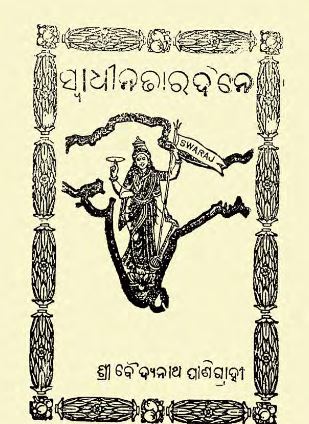The release of Baidyanath Panigrahi’s “Swadhinataradine” in 1947 was more than just the publication of a collection of poems; it was the embodiment of nationalistic fervor and the zeitgeist of an era yearning for liberty. Written during a time when India was on the cusp of achieving independence after centuries of colonial rule, this anthology captures the tumultuous spirit, sacrifices, and aspirations of the people.
“Swadhinataradine,” which translates to “On the Day of Independence,” is an evocative and poignant piece of literary work that poignantly echoes the struggles, triumphs, and hopes of an entire nation. Each poem within this anthology offers an intimate glance into the hearts and minds of those who fought tirelessly for India’s sovereignty. More than just words on paper, these poems serve as a testament to the indomitable will and unwavering spirit of the Indian freedom fighters.
Baidyanath Panigrahi uses the Odia language exquisitely to convey complex emotions and ideas, imbued with a deep sense of patriotism. His mastery of language, coupled with his keen understanding of the sociopolitical atmosphere of the time, allows him to paint a vivid picture of India’s journey towards independence. His words resonate with the reader, bringing to life the sacrifices made by countless individuals for the greater good of the nation.
One of the standout aspects of “Swadhinataradine” is its ability to blend personal emotions with collective experiences. In poems like “Desha Maati” (Motherland’s Soil), Panigrahi personifies the land itself, illustrating the profound connection between the people and their nation. The soil becomes a living entity that feels the pain and joy of its children, a powerful metaphor that underscores the depth of patriotic sentiment.
Another significant theme in Panigrahi’s work is the celebration of heroes, both known and unsung, who played pivotal roles in the freedom struggle. Poems such as “Aamara Veer” (Our Heroes) and “Chenna Pahacha” (Unknown Steps) pay homage to these brave souls, immortalizing their contributions and ensuring that their legacy endures within the pages of history. These poems serve as a reminder that the fight for freedom was a collective effort, involving countless individuals from all walks of life.
The enduring appeal of “Swadhinataradine” lies in its universal message of hope and resilience. While it is deeply rooted in the historical context of India’s independence movement, its themes of courage, unity, and unwavering determination continue to resonate with readers today. The poems inspire a sense of pride, not just in the achievements of the past, but in the potential for a brighter future.
As we reflect on this remarkable work, it becomes clear that Baidyanath Panigrahi’s “Swadhinataradine” is more than just a collection of poems. It is a chronicle of an era, a tribute to the spirit of a nation, and an enduring source of inspiration for generations to come. Published in 1947, it stands as a monumental literary contribution that captures the essence of India’s fight for independence, reminding us of the power of words to ignite change and nurture a sense of collective identity.
In commemorating this iconic anthology, we honour not only the literary genius of Baidyanath Panigrahi but also the valor and sacrifices of all those who contributed to the realization of an independent India. “Swadhinataradine” remains a timeless symbol of patriotic passion, forever etched in the annals of Indian literature.
Books Info
| Books name | Swadhinataradine/ସ୍ବାଧିନତାର ଦିନେ |
| Author | Baidyanath Panigrahi |
| No Of pages | 19 |
| Publisher | NA |
| Publication | 1947 |
| Printed At | NA |
| Distributor | NA |

